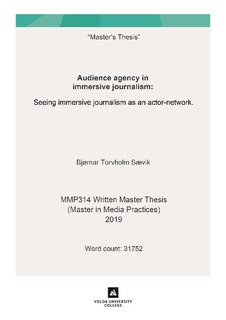Audience agency in immersive journalism. Seeing journalism as an actor-network
Master thesis
Permanent lenke
http://hdl.handle.net/11250/2636218Utgivelsesdato
2019Metadata
Vis full innførselSamlinger
Sammendrag
This master thesis focus on the field of immersive journalism. Nonny de la Peña (2010) who coined the term defines this as “the production of news in a form in which people can gain first-person experiences of the events or situation described in news stories” (de la Peña et al., 2010).
The idea behind immersive journalism is to allow its audience to enter a virtually recreated scenario representing the news story by the use of immersive technologies such as virtual reality systems.
Through qualitative methods, research interviews and participant observation, this research project seeks to approach this relatively new research field in a sociotechnical manner, examining the user experience of immersive journalism. As a theoretical backdrop for gathering and analysing the data collected, Actor-Network Theory has been utilised, initially drawn from the field of social science.
The thesis answer the research question of whether different levels of immersion in immersive journalism tend to make an audience more like active participants in the story creation, rather than passive recipients.
Though the study does not manage to establish a clear link in terms of the levels of immersion and the two audience conceptions, results do indicate agency afforded to the audience. It reveals nuances in the relationships among social actors such as journalists, human audiences and the nonhuman actants mediating their interplay, immersive technologies. The researcher further argues that the Actor-Network Theory may serve a viable framework for further research on the field
The thesis concludes that more research is needed to answer some of the central points raised by in the study.
